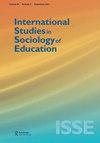Editorial
IF 1.5
Q2 EDUCATION & EDUCATIONAL RESEARCH
International Studies in Sociology of Education
Pub Date : 2022-07-03
DOI:10.1080/09620214.2022.2094616
引用次数: 0
Abstract
International research in sociology of education provides many opportunities to look at realities of education through a critical lens, revealing what may be hidden in the shadows and often giving voice to those who are frequently silenced and inaudible, whose difficulties are sometimes invisible to the public and sometimes explained by personal and deficit-oriented factors. Sociological approaches to education allow us to unveil the context and to identify the mechanisms of discrimination and social reproduction, thus provoking a discussion of the need for education policy and practice changes at the local, national, regional or global levels that will support social mobility and social transformation. The collection of articles on this issue demonstrates the diversity and depth of discussions in the field of sociology of education, with reference to different national contexts. This issue includes studies dealing with the populations of Finland, Israel, Denmark, Taiwan, India and Sweden. In each of the national contexts, there is an emphasis on a different population and exposure to various social structures at play in education, from those that contribute to the exclusion and discrimination of underprivileged populations to those that allow for agency and change. The first article in this collection by Katariina Mertanenhttps, Kalle Mäkelä, and Kristiina Brunila analyzes youth policies as governed by a framing of the problematisation of young people in Finland today. Based on their analysis, the authors argue that such a framing of the ‘youth problem’ is produced through two conflicting rationalities: neoliberalism and paternalism. What can, however, be seen as a shared view in both modes of governing is the perception of young people as a group whose members have seemingly similar characteristics of immaturity, vulnerability and dependence, which makes them different from the rest of society. The authors show that in Finnish education policies, young people are expected to be proactive and responsible for their own future and if they fail to do so, they are directed to various education and training programmes, unpaid work internships, and other forms of engagement. In the second article, Ruo-Fan Lui describes how the Taiwanese college admission system is not understood similarly by students from various social classes. It is argued that cultural knowledge employed by middleclass youth provides them with chances to interpret the seemly transparent admission criteria and therefore obtain an advantage in college applications. INTERNATIONAL STUDIES IN SOCIOLOGY OF EDUCATION 2022, VOL. 31, NO. 3, 261–263 https://doi.org/10.1080/09620214.2022.2094616编辑
教育社会学的国际研究提供了许多机会,可以通过批判性的视角来看待教育现实,揭示隐藏在阴影中的东西,并经常为那些经常被沉默和听不见的人发出声音,他们的困难有时被公众所忽视,有时被个人和赤字导向的因素所解释。教育的社会学方法使我们能够揭示背景,确定歧视和社会再生产的机制,从而引发对地方、国家、区域或全球各级教育政策和实践变革的必要性的讨论,以支持社会流动和社会转型。关于这一问题的论文集显示了教育社会学领域讨论的多样性和深度,并参考了不同的国情。这一期包括关于芬兰、以色列、丹麦、台湾、印度和瑞典人口的研究。在每个国家的情况下,都强调不同的人口和在教育中发挥作用的各种社会结构,从那些有助于排斥和歧视弱势人口的社会结构到那些允许能动性和变革的社会结构。Katariina Mertanenhttps、Kalle Mäkelä和Kristiina Brunila撰写的第一篇文章分析了当今芬兰青年问题化框架下的青年政策。基于他们的分析,作者认为这种“青年问题”的框架是由两种相互冲突的理性产生的:新自由主义和家长制。然而,在这两种管理方式中可以被视为共同观点的是,认为年轻人是一个群体,其成员似乎具有不成熟、脆弱和依赖的相似特征,这使他们与社会其他人不同。作者指出,在芬兰的教育政策中,人们期望年轻人积极主动,对自己的未来负责,如果他们做不到这一点,他们就会被引导到各种教育和培训项目、无薪工作实习和其他形式的参与中。在第二篇文章中,吕若凡描述了来自不同社会阶层的学生对台湾大学录取制度的理解是如何不同的。有人认为,中产阶级青年所使用的文化知识为他们提供了解释看似透明的录取标准的机会,从而在大学申请中获得优势。教育社会学国际研究,2022,第31卷,第31期。3,261 - 263 https://doi.org/10.1080/09620214.2022.2094616
本文章由计算机程序翻译,如有差异,请以英文原文为准。
求助全文
约1分钟内获得全文
求助全文
来源期刊
CiteScore
3.40
自引率
7.70%
发文量
34
期刊介绍:
International Studies in Sociology of Education is an international journal and publishes papers in the sociology of education which critically engage with theoretical and empirical issues, drawn from as wide a range of perspectives as possible. It aims to move debates forward. The journal is international in outlook and readership and receives papers from around the world. The journal publishes four issues a year; the first three are devoted to a particular theme while the fourth is an "open" issue.

 求助内容:
求助内容: 应助结果提醒方式:
应助结果提醒方式:


